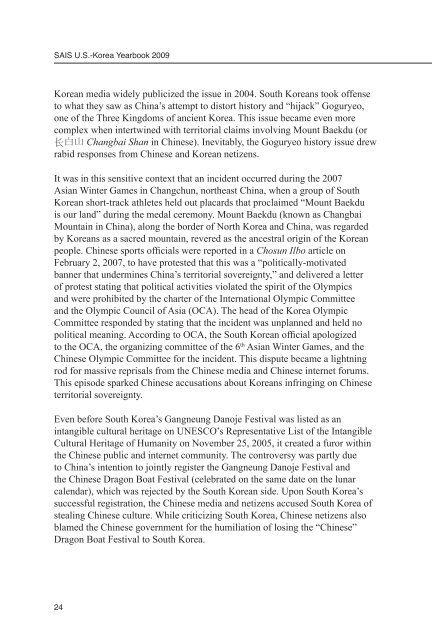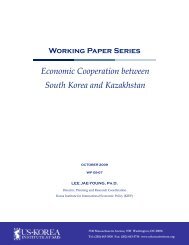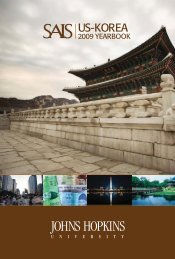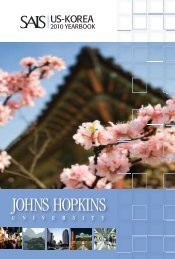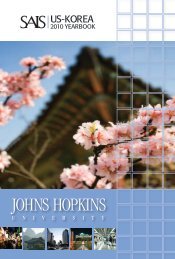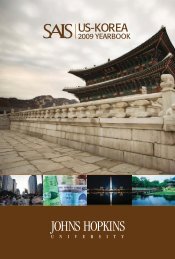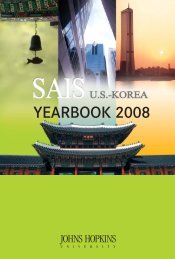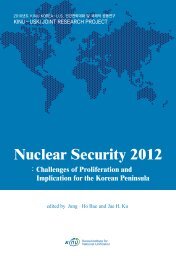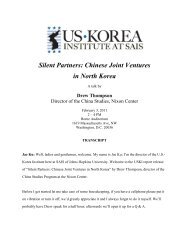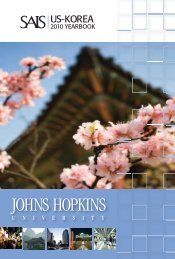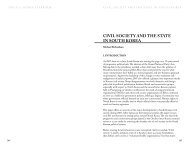US-Korea Institute at SAIS
US-Korea Institute at SAIS
US-Korea Institute at SAIS
- No tags were found...
Create successful ePaper yourself
Turn your PDF publications into a flip-book with our unique Google optimized e-Paper software.
<strong>SAIS</strong> U.S.-<strong>Korea</strong> Yearbook 2009<br />
<strong>Korea</strong>n media widely publicized the issue in 2004. South <strong>Korea</strong>ns took offense<br />
to wh<strong>at</strong> they saw as China’s <strong>at</strong>tempt to distort history and “hijack” Goguryeo,<br />
one of the Three Kingdoms of ancient <strong>Korea</strong>. This issue became even more<br />
complex when intertwined with territorial claims involving Mount Baekdu (or<br />
Changbai Shan in Chinese). Inevitably, the Goguryeo history issue drew<br />
rabid responses from Chinese and <strong>Korea</strong>n netizens.<br />
It was in this sensitive context th<strong>at</strong> an incident occurred during the 2007<br />
Asian Winter Games in Changchun, northeast China, when a group of South<br />
<strong>Korea</strong>n short-track <strong>at</strong>hletes held out placards th<strong>at</strong> proclaimed “Mount Baekdu<br />
is our land” during the medal ceremony. Mount Baekdu (known as Changbai<br />
Mountain in China), along the border of North <strong>Korea</strong> and China, was regarded<br />
by <strong>Korea</strong>ns as a sacred mountain, revered as the ancestral origin of the <strong>Korea</strong>n<br />
people. Chinese sports officials were reported in a Chosun Ilbo article on<br />
February 2, 2007, to have protested th<strong>at</strong> this was a “politically-motiv<strong>at</strong>ed<br />
banner th<strong>at</strong> undermines China’s territorial sovereignty,” and delivered a letter<br />
of protest st<strong>at</strong>ing th<strong>at</strong> political activities viol<strong>at</strong>ed the spirit of the Olympics<br />
and were prohibited by the charter of the Intern<strong>at</strong>ional Olympic Committee<br />
and the Olympic Council of Asia (OCA). The head of the <strong>Korea</strong> Olympic<br />
Committee responded by st<strong>at</strong>ing th<strong>at</strong> the incident was unplanned and held no<br />
political meaning. According to OCA, the South <strong>Korea</strong>n official apologized<br />
to the OCA, the organizing committee of the 6 th Asian Winter Games, and the<br />
Chinese Olympic Committee for the incident. This dispute became a lightning<br />
rod for massive reprisals from the Chinese media and Chinese internet forums.<br />
This episode sparked Chinese accus<strong>at</strong>ions about <strong>Korea</strong>ns infringing on Chinese<br />
territorial sovereignty.<br />
Even before South <strong>Korea</strong>’s Gangneung Danoje Festival was listed as an<br />
intangible cultural heritage on UNESCO’s Represent<strong>at</strong>ive List of the Intangible<br />
Cultural Heritage of Humanity on November 25, 2005, it cre<strong>at</strong>ed a furor within<br />
the Chinese public and internet community. The controversy was partly due<br />
to China’s intention to jointly register the Gangneung Danoje Festival and<br />
the Chinese Dragon Bo<strong>at</strong> Festival (celebr<strong>at</strong>ed on the same d<strong>at</strong>e on the lunar<br />
calendar), which was rejected by the South <strong>Korea</strong>n side. Upon South <strong>Korea</strong>’s<br />
successful registr<strong>at</strong>ion, the Chinese media and netizens accused South <strong>Korea</strong> of<br />
stealing Chinese culture. While criticizing South <strong>Korea</strong>, Chinese netizens also<br />
blamed the Chinese government for the humili<strong>at</strong>ion of losing the “Chinese”<br />
Dragon Bo<strong>at</strong> Festival to South <strong>Korea</strong>.<br />
24


